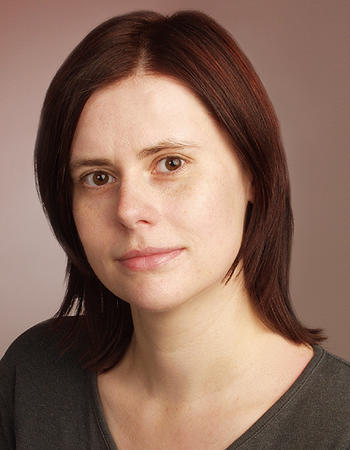Dr. Ines Schindler
Ines Schindler
Dr. rer. nat.
Curriculum Vitae
| 10/2014 - 03/2015 |
Substitute Professor at the Chair “Differential Psychology and Diagnostics”, Department of Psychology, University of Potsdam |
| 04/2014 - 09/2014 |
Lecturer (1/3 position) at the Chair “Differential Psychology and Diagnostics”, Department of Psychology, University of Potsdam Research Associate (1/3 position) in Project “Production and Perception of Emotion: An Affective Sciences Approach” (PROPEREMO; headed by Prof. Dr. Klaus R. Scherer, Prof. Dr. Winfried Menninghaus, and Prof. Dr. Michael Eid; founded by European Research Council (ERC) Advanced Grant awarded to Klaus R. Scherer), Department of Education and Psychology, Methods and Evaluation Division, Freie Universität Berlin Research Associate (1/3 position) in Project “Being Moved” (headed by Prof. Dr. Winfried Menninghaus and Prof. Dr. Thomas Jacobsen), Department of Language and Literature, Max Planck Institute for Empirical Aesthetics, Frankfurt am Main |
|
01/2014 - 03/2014 |
Research Associate (2/3 position) in Project „Production and Perception of Emotion: An Affective Sciences Approach“ (PROPEREMO; ERC Advanced Grant; headed by Prof. Dr. Klaus R. Scherer, Prof. Dr. Michael Eid, Prof. Dr. Winfried Menninghaus), Free University Berlin and Research Associate (1/3 position) in Project „Being Moved“ (headed by Prof. Dr. Winfried Menninghaus, Prof. Dr. Thomas Jacobsen), Max Planck Institute for Empirical Aesthetics, Frankfurt am Main |
|
02/2009 – 12/2013 |
Research Associate in Interdisciplinary Research Group „Adoration and Admiration“ (headed by Dr. Johannes Windrich), Cluster of Excellence “Languages of Emotion”, Free University Berlin |
|
12/2007 – 11/2008 |
Postdoc with Prof. Dr. Rainer K. Silbereisen, Center for Applied Developmental Science, Friedrich Schiller University Jena |
|
12/2005 – 11/2007 |
Postdoc with Prof. Dr. Cynthia A. Berg, Department of Psychology, University of Utah |
|
01 – 04/2002 |
Visiting Ph.D. Research Fellow with Prof. Dr. John R. Nesselroade, Quantitative Psychology Department, University of Virginia |
|
09/2000 – 09/2005 |
Predoctoral Fellow with Prof. Dr. Ursula M. Staudinger, Dresden University of Technology |
|
2005 |
Dr. rer. nat., Dresden University of Technology |
|
2000 |
Diploma in Psychology., Humboldt University Berlin |
Awards and Fellowships
- 12/2007 – 05/2008 Return Grant of the German Research Foundation (DFG)
- 12/2005 – 11/2007 Research Fellowship and Research Grant of the German Research Foundation (DFG)
- 06/2006 Werner Straub Award of the Verein Psychologie-Kontakt e.V. for outstanding achievements during academic qualification
- 01 – 03/2002 Fellowship of the German Academic Exchange Service (Deutscher Akademischer Austauschdienst, DAAD) for Ph.D.-research studies at the University of Virginia
Reviews for: Applied Cognitive Psychology, International Journal of Behavioral Development, International Journal of Aging and Human Development, Journals of Gerontology: Psychological Sciences, Journal of Happiness Studies, Personal Relationships, Psychology and Aging, Zeitschrift für Entwicklungspsychologie und Pädagogische Psychologie
Professional Memberships: American Psychological Association (APA), German Psychological Association (Deutsche Gesellschaft für Psychologie, DGPs), International Society for Research on Emotion (ISRE), Society for the Study of Motivation (SSM)
Lectures on the topics
- Personality Psychology
- Psychological Diagnostics
Seminars on the topics
- Advanced Diagnostics
- Motivational development across the life span
- Motivation and competence across the life span
- Developmental tasks of midlife and old age
- Development of self and personality in adulthood and old age
- Cognitive development in childhood and adolescence
- Continuity and discontinuity of development
- Social development across the life span
- Aesthetic and self-transcendent emotions
- Being moved, being touched, rapture
- Admiration and adoration
- Role of emotions for life composition
- Life-path decisions
- Personal goals and goal striving across the life span; personal life investment
- Interpersonal aspects of goal striving; shared goals; functions of collaboration
- Attachment relationships
- Processes of developmental regulation and successful development; well-being
|
Journal |
|
|
Book |
|
|
Qualification Works |
|
|
Further Publications |
|
